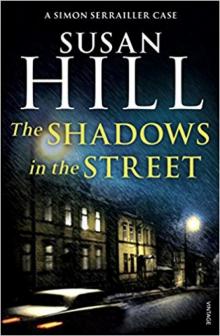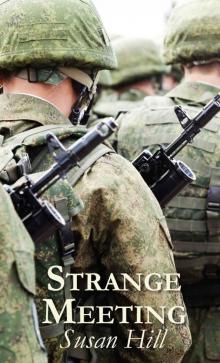- Home
- Susan Hill
The Comforts of Home Page 2
The Comforts of Home Read online
Page 2
The door opened and he saw a man in dark chinos, pale blue sweatshirt. Dark wavy hair. He thought of his own blond hair and realised that he hadn’t needed to push it back from where it always flopped over his forehead for some time. What time? Maybe for years.
‘Where’s my hair?’ he said, to the man with so much of it.
‘They had to shave it off to do the repairs, I think. Don’t worry, it’s growing back.’ The man had taken the chair beside his bed. Simon knew him. Knew him fairly well.
‘Hi,’ he said, to give himself time.
‘Cat sends her love and she’s glad things are looking good but she had to cover for a colleague – there wasn’t anybody else apparently. She’ll be here tomorrow.’
So the man knew Cat.
‘I wish my bloody brain would get its mojo back. Sick of thinking through cotton wool.’
‘That’s the drugs.’
So he knew about those too.
The bolt shot backwards and the door fell open. ‘Chief …’ Simon said. He ought to sit up but his body was covered in lead weights.
Kieron Bright smiled. ‘Me,’ he said. ‘Don’t worry, that’s the drugs as well. How do you feel?’
‘Weird. Listen, they haven’t told me much. What happened?’
For the next half-hour, Kieron told him. Serrailler thought he was sparing him some of the detail, perhaps only for the time being, but the broad outline of what had happened to him was clear, and as the Chief spoke, now and then a glimmer of something came and went on the horizon of his mind. He remembered but he did not quite remember, and yet it seemed familiar, it made some sort of sense.
‘I can’t tell you much about your injuries but the docs have done that.’
‘Not really.’
‘They have told you – you probably didn’t take it all in, which is understandable.’ He leaned back in the chair, arms folded. In casual clothes, the Chief looked younger, but that was usually the case. Gold braid lent gravitas and with gravitas came age. He was only four years older than Simon.
‘Thanks for coming down here.’
‘I’ve been before but you were out of it. It’s good to see you now. We were worried.’
‘I’m invincible.’
‘So it would seem. Your sister wasn’t so sure.’ He crossed one leg over the other, then recrossed them. Simon was aware of some sort of tension about him, or else an anxiety – he couldn’t tell, even though the mists that had swirled around his brain were clearing again. And his arm was hurting.
‘I’ve taken her out a couple of times.’
‘Cat?’
‘Cat. Hope that’s all right with you.’
Simon laughed. ‘Nothing to do with me – her life’s her own affair.’
‘You’re close though.’
‘Yes … we always have been. Strange – you’d have expected it to be me and Ivo but it never was. He was always the odd one out. Ivo’s quite different.’
‘Cat says the same.’
So, they had talked in that way, which Cat rarely did. She had never been an especially private person about herself, her marriage, career, children, doings, but about the three of them she was, and so was he, come to that. He didn’t know about Ivo. Australia had beckoned for Ivo even before he had qualified as a doctor, and the moment he had, it had claimed him permanently. He had never been back.
When Kieron had left, and before the next lot of painkillers kicked in, he had a lucid interlude in which to think, about the man, as Chief Constable and therefore his own boss, and also as someone in a relationship – whatever that turned out to be – with his sister.
He turned the thought round, looking at every side carefully, the idea of the two of them together was like a globe he was holding.
Nothing looked wrong. Nothing worried him.
‘How’s it feeling?’ The brisk, unsmiling sister. Unsmiling but not unfeeling, he thought, but she wasn’t going to be caught out in any display of sympathy. A bit like him.
‘Actually, even when the meds need topping up, it isn’t so bad – a hell of a lot better than before.’
‘Good.’
‘When can I see it?’
‘Mr Flint will decide. Perhaps tomorrow.’
‘When will I be able to start using it again? No – forget that. “Mr Flint will decide.” But, dear dear Sister, couldn’t you be Mr Flint, just for now?’ He raised an eyebrow. She threw the used syringe in the sharps bin, peeled off her latex gloves, threw those away too. On the way out of the room, she said, ‘Don’t push your luck.’
Simon thought she might just have been smiling.
The following morning she was holding his right arm and another nurse was pushing his drip stand as he took his first walk, slow steps down the hospital corridor. His legs felt uncertain, as if they were waiting to be told how to move forward, one and then the other, but by the time they reached the junction with another corridor, it had fallen into place.
‘I can go on.’
‘What was it I said?’
‘Don’t push your luck?’
‘So don’t. But that was very good and you can have another jaunt later.’
Simon felt as pleased as a child with ticks all over his homework.
Two more walks down the corridors and speeding up. Walking felt normal again. All the bruising and contusions he had noted on his body, legs, right arm, were fading and healing well. He saw in the mirror that his hair had now grown back over most of the scarring and stitches on the front of his head. Would they shave it again when they took them out? Would they take them out? He meant to ask but the nurses had gone. He felt suddenly exhausted, then very cold. There was so little in the way of bedding. He needed a duvet but hospitals did not have duvets.
‘Supper.’
The tray with the tin lid on top of the plate. A side dish of what looked like tinned fruit salad and custard. The young man lifted the lid with a flourish and the smell of cauliflower wafted up. Cauliflower. A slab of quiche. Three small potatoes.
‘I don’t think I’m hungry actually. Could you take it away?’
He smiled and said, ‘You must try now.’ Polish? Romanian? ‘Eating is right. Not eat not get well. OK?’
And he swung out of the door. The trolley wheels screeched on the corridor floor and the tin lids rattled on the dishes.
He could not eat. He could not have swallowed anything, though he drank the glass of water and tried to lean over to the jug on his side table and pour another. But he couldn’t reach.
He was so hot he felt ill. He felt ill from the smell of the food and the heat and a headache and the throbbing in his left arm.
After a long time of lying still, feeling increasingly worse, wondering if someone would come, wondering what to do with his food tray, wondering, in the end, where he was and why, he noticed something on the bedcover. He was confused by what it was but he reached out his hand and found that there was a button that he could press.
‘Altos, you’re still not together. I know it’s tricky, but once more please.’
It was tricky. They had been rehearsing the John Tavener piece for a month and they were barely getting to grips with it. The altos were struggling. Cat was struggling. The Mozart Requiem, which the St Michael’s Singers were performing in the same concert, was smooth sailing by comparison.
‘It’s no harder than the Britten we did at Christmas – now come on, focus.’
‘It’s way harder,’ Cat’s next-door neighbour in the altos muttered. ‘Honestly, we’re not the London Philharmonic Choir.’
‘No, Nancy – we are aiming to be even better. Right, back to page four please.’
Andrew Browning, the conductor, was a hard taskmaster, far more exacting than his predecessor. He was becoming known in the ranks of singers as Browning the Cruel.
‘One two three AND …’
Cat’s phone vibrated in her pocket. She ignored it. It continued to vibrate every few minutes and she continued to ignore it. If Sam had for
gotten his front door key yet again he could wait in the garden shed.
They hit a rich singing seam and suddenly things clicked into place. Perhaps Tavener was possible after all.
They broke for drinks and Cat checked her phone. Sam’s name flashed up on the screen. No, she thought, one time too many, Sambo, this will now teach you to remember your key. She pictured him, huddled in the shed, waiting for her to get home.
‘Cat, someone wants you.’
She looked up. Sam was not in the garden shed, he was walking down the hall towards her and his face told her that this was not about a lost key.
‘How did you get here?’
‘Kieron. I could only think of him because you weren’t answering. You’ve got to come, the car’s waiting.’
‘What car? What for?’
‘Simon. The hospital rang. Mum – hurry up.’
Kieron was not like her husband, Chris, in more ways than she could count, but in two, and the two mattered greatly to her, they were the same. Chris had been calm and unflappable. So was Kieron – probably more so. She realised the second similarity on the way home very late that night. Kieron did not ask her how she was feeling, did not try to put a good face on what had happened, did not once say, about Simon, ‘Well, at least he …’ He sat beside her in the back of the car, he held her hand, and he said nothing until she did. They travelled swiftly and smoothly, but there was no race to get to Simon now. It had happened. They had arrived in time to see him being wheeled out of theatre and back to his room. Coming out behind him, still in his scrubs, the surgeon had beckoned them to follow him into an empty bay. He and Kieron stood, Cat sat in the one chair.
‘I’m afraid I couldn’t wait for you to get here. Time is crucial – the infection in his arm was spreading fast and if I hadn’t got to it he would probably have died of sepsis. It was bad.’
‘So you had to amputate.’
‘I had no choice. It is absolutely maddening because I was pretty sure I’d saved the arm. It took a long time but it worked. Things went my way and it was looking better than I’d dared hope.’
‘Then this.’
‘Sepsis is always a risk, no matter how careful we are.’
‘I often tell people that as far as infections are concerned, they’re safer out of hospital than in it.’
The surgeon shrugged. He looked exhausted, his face grey, dark circles beneath his eyes. It was well past midnight.
‘You can go in and see him briefly but he probably won’t be aware you’re there.’
‘But he will be all right?’ It was the first time Kieron had spoken.
‘Yes. The source of infection has gone and he’s being pumped full of the strongest antibiotics we have, the ones we use sparingly. His temperature’s down. Yes, he’ll be fine. Not sure when I can let him out of ITU but there’s no reason why he shouldn’t be ready to go home in a couple of weeks. Then it all starts.’
‘Physio?’
‘Yes, but mainly fitting up for a prosthesis. They’ll want to get going as soon as it’s safe. I’m referring him to the best specialist unit.’ He stood up. ‘Tomorrow,’ he said. ‘I’m bushed.’
After he had left, they stayed together in silence for several minutes. The theatre area was quiet. Only emergency surgery went on at this time of night and for now there was none. Hospitals were so rarely still like this. Kieron put out his hand. ‘Listen, you’ll want to see him but not tonight, when he won’t have come round. I’ve phoned in to tell them I have to be off tomorrow but they’ll ring me if something urgent blows up. So I suggest I try and find us a hotel, we go there and get a drink and hopefully at least a sandwich, and come back first thing in the morning. And’ – he put his hand on hers – ‘no strings. Two rooms.’
‘I wasn’t –’
‘I know. Nor was I. Come on, nothing you can do tonight and you need sleep.’
The chain hotel was a mile away. It was clean, comfortable, they had rooms, they had a bar that was still open. Cat felt as if she were swimming rather than walking on solid ground as she followed Kieron to a table. She had put her feelings about Simon in a reserved space of her mind which doctors kept for just this purpose. When you could not deal with something shocking and distressing immediately, you learned early on to park it. But not to bury it. That way, stored-up problems began to fester.
Kieron had brought over two larges whiskies and a jug of water. Late-night food was available until two. He had ordered omelettes.
‘OK?’
Cat shook her head. ‘I’m all right. I can deal with it. But you have to answer one question, Kieron. It’s the most important thing after “will he live?”.’
‘I’m pretty sure I know that question.’
‘All right.’
‘Presuming Simon is otherwise fine but he has a prosthetic arm, can he still be in the police force?’
She searched his face and could see nothing there.
‘Of course he can. Absolutely. It goes without saying and especially in CID. He could still be uniform, for that matter, but there would be more adjustments and a few restrictions. In CID, not at all.’
‘And that’s the truth?’
‘It will be my call, once the medics have had their say and Simon tells me he wants to stay. He might not.’
‘Oh he will. What else would he do?’
‘Does he draw with his left hand?’
‘No, he’s right-handed. But however good he is – and he is good – he couldn’t do that alone. He’s a cop. It’s what has made him who he is, for the last twenty-odd years.’
‘He’ll still be a cop.’
Their food came and Cat ate hers and finished her drink while she could keep her eyes open.
‘I need to deal with a few things. You go to bed. We can have breakfast before we go in to see him, then I’ll have to head back to Lafferton.’
‘Thank you,’ she said, and her eyes filled with tears that she was not expecting. ‘I couldn’t have got through this without you.’
‘Of course you could. I’m just glad you haven’t had to.’ He reached out his hand and she took it for a second, before using her last fragments of energy to get up to her room and bed.
Kieron finished his whisky and sat on, thinking about a Detective Chief Superintendent who had been through mental and emotional as well as extreme physical trauma, and who now had to face a slow, difficult journey to what recovery there could be. He was aware of major advances in prosthetics, of bionic arms that could be fitted up in such a way that they fulfilled orders directly from the brain, to perform tasks almost as well as a natural one. He knew that Serrailler would be at minimal disadvantage in terms of the job. He would be able to use a computer and drive a car as well as be on top of all the aspects of the work which would not be affected at all – interviewing, going over casework, meeting with colleagues, briefing a team.
But he was aware, as he had to be, that Simon was not a straightforward man. He was a fine detective but he had personal issues, perhaps ones he would never resolve, and although in the past they had no impact on his work, they might surface now, when he was at his most helpless, and cause problems. It was impossible to know. All he himself could do was watch and wait, give whatever help and support he could and have neither too many nor too few expectations. He could also make the rest of the Lafferton team aware of the importance of their doing the same.
The bar was empty. He finished the last splash of Scotch, with a lot of water and got up. He hoped Cat was able to sleep.
Cat. She was a strong, resilient, capable woman, a conscientious doctor, a loving single parent. But he had realised early on that she was vulnerable, not only through her children, but through her brother. She knew Simon as well as anyone – better, probably, than he knew himself. She would understand completely how this trauma would affect him, and not in the obvious ways. Physically, he would cope. But there was a great deal more to his recovery than some rehabilitation and physiotherapy. Serrailler would nee
d everyone’s help, and above all, he would need Cat and she would give him whatever he asked for and more.
What concerned and preoccupied Kieron, as he crossed the hotel lobby towards the lifts, was whether that meant she would have anything left over, from her brother and her children, for anyone else.
He woke just after six o’clock and could not get back to sleep. The room was comfortable enough but overheated and the windows were sealed. He went out. The streets around the hotel were as dull as the streets of any area bordering on an industrial estate and a motorway. Kieron would have run, which always made boring places less boring simply because you did not have time to take them in, but he had to make do with fast walking because he had not brought any sports gear. He walked for forty minutes, around concrete and metal office blocks, storage warehouses, wholesale units, the car parks which were already starting to fill up. A mile to the right he saw the flat roof of the hospital. He turned back.
Cat was still not up, so he got coffee and checked his phone. No messages. He waited another half-hour, reading the papers, before calling the station. His PA was in but had nothing for him either. He felt oddly restless, as if he should be on the spot to get things started, no matter what they were. He called the duty sergeant.
‘Nothing to report, Chief. Couple of RTAs on the other side of the county and all dealt with. One reported breaking and entering but false alarm.’
‘Quiet night everywhere then.’
‘Pretty much. Just one report, and it’s probably nothing. Lafferton. Someone made a bonfire by the old warehouses along the canal. The fire was made like you would do one for Guy Fawkes Night – wood offcuts, sticks, a couple of dead branches. Paper. Wigwam shape. There was a bicycle tyre on top and then they’d poured over half a can of varnish. It was the smell that alerted everyone, quite a few people called in – that and the thick black smoke. Fire brigade got it out in no time and sorted it, but it was peculiar. Who’d take the trouble?’
‘Some lunatic. But no damage?’
‘Not even close to overhanging bushes.’
‘If that’s the worst of the night’s revels, we can’t complain.’
As he finished talking, Cat walked in.

 Mrs De Winter
Mrs De Winter A Question of Identity
A Question of Identity The Various Haunts of Men
The Various Haunts of Men The Pure in Heart
The Pure in Heart Printer's Devil Court
Printer's Devil Court The Travelling Bag
The Travelling Bag The Risk of Darkness
The Risk of Darkness A Kind Man
A Kind Man Black Sheep
Black Sheep The Betrayal of Trust
The Betrayal of Trust The Service of Clouds
The Service of Clouds Betrayal of Trust
Betrayal of Trust The Small Hand
The Small Hand Dolly
Dolly Jacob's Room Is Full of Books: A Year of Reading
Jacob's Room Is Full of Books: A Year of Reading The Vows of Silence
The Vows of Silence The Soul of Discretion
The Soul of Discretion The Shadows in the Street
The Shadows in the Street The Man in the Picture
The Man in the Picture Air and Angels
Air and Angels Strange Meeting
Strange Meeting In the Springtime of the Year
In the Springtime of the Year Howards End Is on the Landing: A Year of Reading From Home
Howards End Is on the Landing: A Year of Reading From Home From the Heart
From the Heart Old Haunts
Old Haunts The Mist in the Mirror
The Mist in the Mirror The Woman in Black: A Ghost Story
The Woman in Black: A Ghost Story A Question of Identity (Simon Serrailler 7)
A Question of Identity (Simon Serrailler 7) The Comforts of Home
The Comforts of Home Mist in the Mirror
Mist in the Mirror Jacob's Room is Full of Books
Jacob's Room is Full of Books The Woman in Black
The Woman in Black Howards End is on the Landing
Howards End is on the Landing